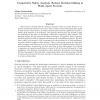Free Online Productivity Tools
i2Speak
i2Symbol
i2OCR
iTex2Img
iWeb2Print
iWeb2Shot
i2Type
iPdf2Split
iPdf2Merge
i2Bopomofo
i2Arabic
i2Style
i2Image
i2PDF
iLatex2Rtf
Sci2ools
131
click to vote
JAIR
2002
2002
Competitive Safety Analysis: Robust Decision-Making in Multi-Agent Systems
Much work in AI deals with the selection of proper actions in a given (known or unknown) environment. However, the way to select a proper action when facing other agents is quite unclear. Most work in AI adopts classical game-theoretic equilibrium analysis to predict agent behavior in such settings. This approach however does not provide us with any guarantee for the agent. In this paper we introduce competitive safety analysis. This approach bridges the gap between the desired normative AI approach, where a strategy should be selected in order to guarantee a desired payoff, and equilibrium analysis. We show that a safety level strategy is able to guarantee the value obtained in a Nash equilibrium, in several classical computer science settings. Then, we discuss the concept of competitive safety strategies, and illustrate its use in a decentralized load balancing setting, typical to network problems. In particular, we show that when we have many agents, it is possible to guarantee an ...
| Added | 22 Dec 2010 |
| Updated | 22 Dec 2010 |
| Type | Journal |
| Year | 2002 |
| Where | JAIR |
| Authors | Moshe Tennenholtz |
Comments (0)

